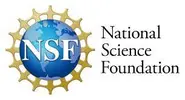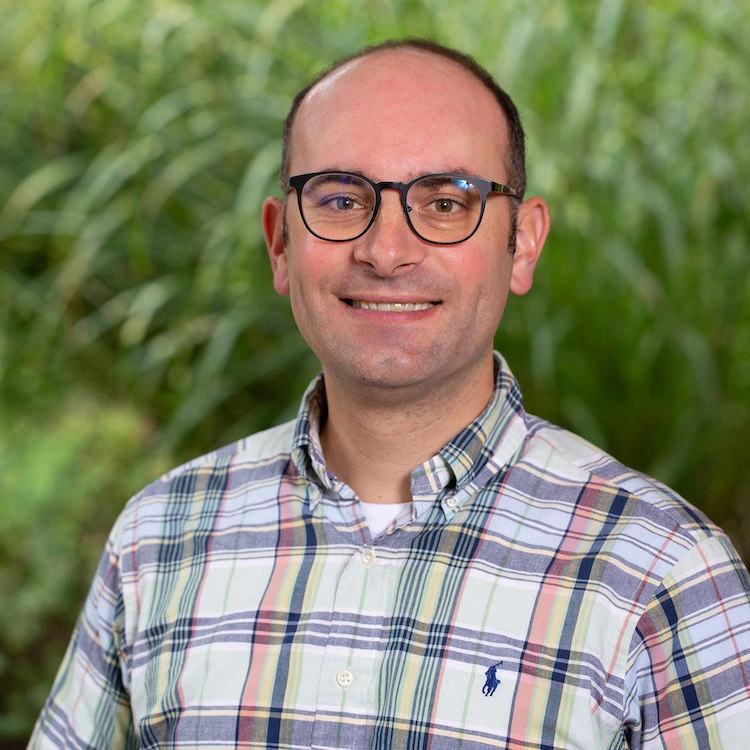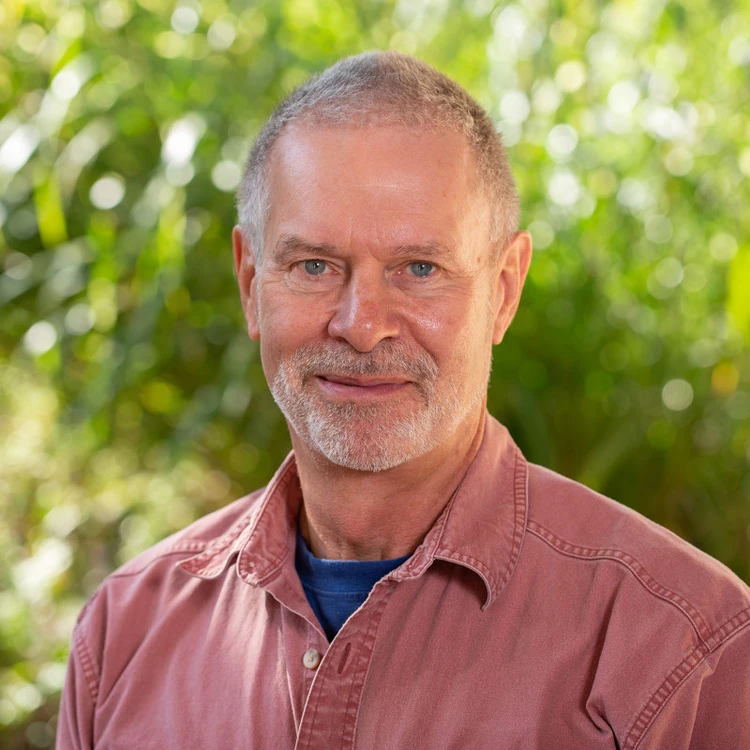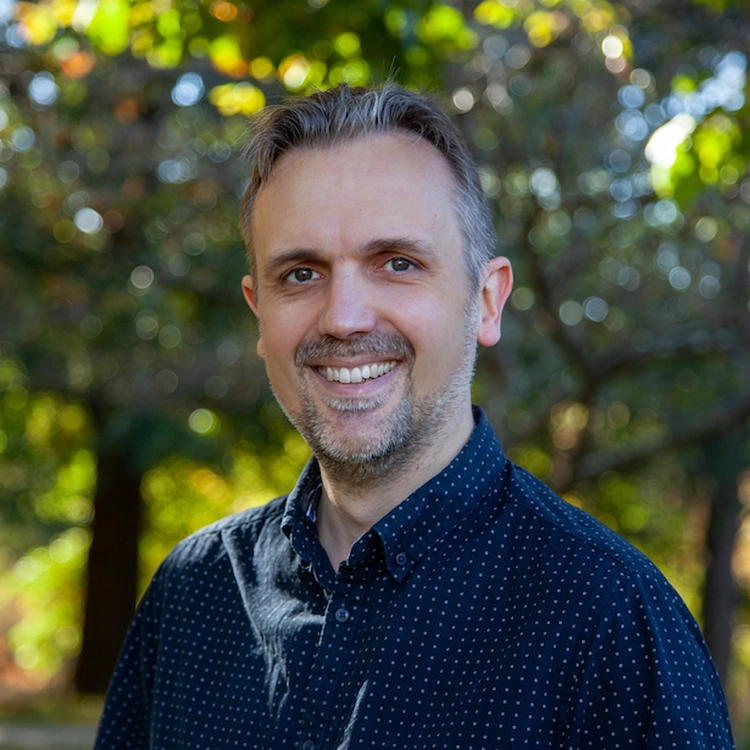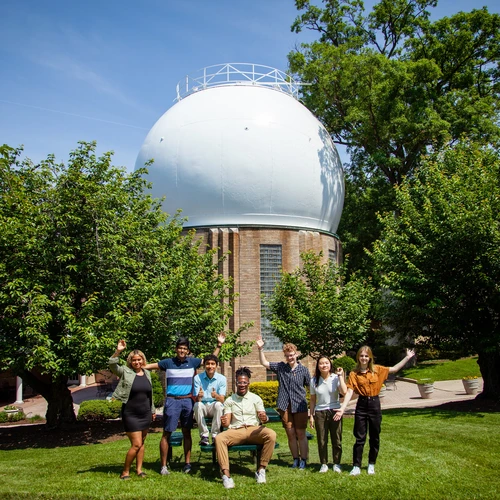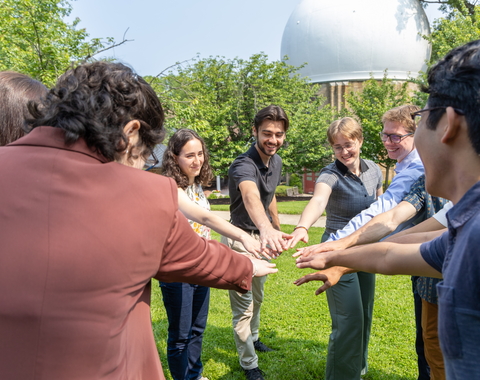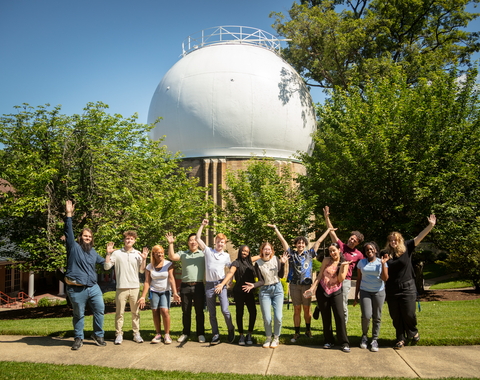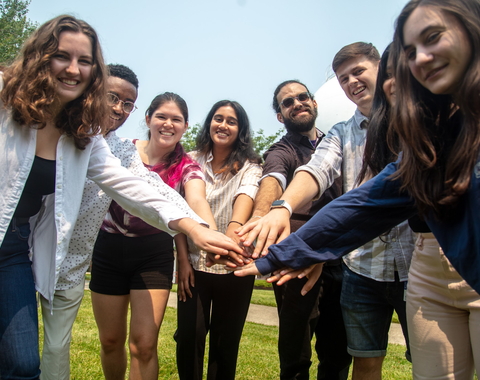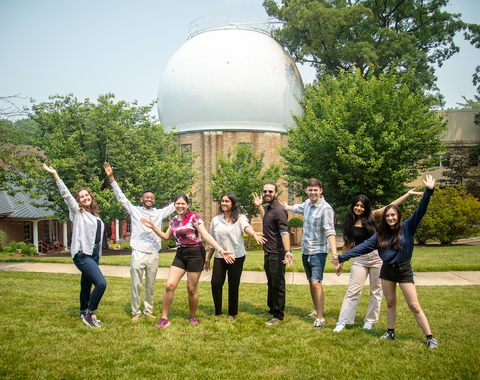Program Description
The Earth and Planetary Science Interdisciplinary Internships (EPIIC) program at the Carnegie Science Earth and Planets Laboratory (EPL) offers a unique opportunity for undergraduate students to gain hands-on experience in the fields of Earth, planetary, and astronomical sciences. We are particularly interested in applications from freshman and sophomore students attending institutions with limited local research opportunities (e.g., community and liberal arts colleges) and/or those who have not conducted research before.
During the 10-week program (June 1 - August 7, 2026), interns will work under the supervision of experienced researchers in the fields of astronomy, astrobiology, biogeochemistry, cosmochemistry, data science, experimental geochemistry/petrology, geophysics, isotope geochemistry, high-pressure mineral physics, mineralogy, organic geochemistry, and petrology.
Interns will work with their Carnegie mentor on an assigned research project with the ultimate goal of developing an original research finding that is suitable for presentation at a national scientific meeting during the following academic year. Interns are full members of their mentors’ research groups, participate in regular group meetings, and attend weekly seminars and social events at the EPL aimed at establishing a collegial cohort. EPIIC’s intensity and training will prepare its participants for graduate student life.
Program Dates: June 1 - August 7, 2026
Applications Due: January 30, 2026
We expect to make a first round of offers on March 6th, with an acceptance deadline of March 15th. If there's a second round of offers, they'll be sent out shortly after March 15th. We’ll notify all applicants when the positions are filled. The selection process should be completed by the end of March
Move In: May 31, 2026
Move Out: August 8, 2026
-
This is a paid, full-time position with a stipend of $6000 dispersed at the beginning and the middle of the program.
-
The cost of housing (but not meals) at the nearby American University is included in the program and does not come out of the stipend. Move-in/out days from the AU dorms will be May 31st and August 8th.
- Interns will also have access to the Earth and Planets Laboratory facilities including the library and research facilities necessary for carrying out their research.
- Interns will be provided with necessary computing resources (e.g., a laptop, project-specific software).
- Interns can receive support for relocation expenses up to $300.
- Funds are available for the interns to attend and present their work at professional meetings following the conclusion of the internship and in consultation with their research mentor(s).
Participants in the EPIIC internship are expected to:
- Work on a research project under the guidance of a mentor.
Mentor(s) and mentee(s) sign a document after discussion that sets expectations and goals for their summer collaboration. The student carries out a research project crafted by the mentor(s), with the opportunity for modifications and/or additions based on the student’s skills and motivation.
- Acquire expertise in research methods while carrying out a research project.
Acquiring expertise in the research methods starts the first week the student is at EPL, and within several weeks, students can carry out independent work.
- Participate in professional development workshops.
The student participates in several research and science communication skills workshops that supplement the more topic-specific skills they gain from the research project and meets weekly as a group with the coordinator to provide research updates.
- Prepare an AAS- or AGU-style abstract of the work presented before the end of July
The oral presentations are styled after national meetings (AGU, GSA, or AAS), and questions by the audience are encouraged. An abstract for the presentation is required, which will, if the student chooses, form the basis for an abstract to be submitted for a presentation at a national meeting during the following academic year.
- Participate in evaluations
Students and mentors participate in a series of beginning, mid-, and end-of-program evaluations to assess the mentor-mentee interactions, the progress of the students in gaining research skills, and overall experience in the full program.
- Meet weekly with the program coordinator to provide research updates.
-
Must be 18 years or older by May 21, 2026
-
Must be an undergraduate student enrolled (part-time or full-time) in a degree program leading to a baccalaureate or associate degree.
-
Must be able to commit to the full 10-week program in person (June 1, 2026 - August 7, 2026)
-
For the projects funded through the National Science Foundation, EPIIC interns must be U.S. citizens, U.S. nationals, or U.S. permanent residents. International F1 students are not eligible for projects this year.
Please contact program manager Dr. Dionysis Foustoukos at dfoustoukos@carnegiescience.edu and/or Dr. Johanna Teske at jteske@carnegiescience.edu with any questions or concerns.
2026 Internship Projects
Mentors: Anirudh Prabhu, Michael L. Wong
Subdisciplines: Astronomy, Planetary Science, Data Science
How do planetary systems form and evolve? What new exoplanets are waiting to be discovered? In this project, we will apply machine learning methods to large exoplanet datasets to identify patterns that reveal trends in planetary system architecture, predict the presence of undiscovered planets, and guide future astronomical observations. The intern will learn to curate data from the NASA Exoplanet Archive and utilize machine learning methods to explore exoplanet data. The intern will also develop a deeper understanding of state-of-the-art exoplanetary science, including exoplanet demographics, characterization, and formation. As a result, the intern will gain experience in all aspects of planetary informatics, including data resource management, data visualization, data analysis, the interpretation of machine learning models, and the communication of key scientific findings.
Recommended prerequisites: Experience in coding, preferably in R.
Mentor: Jennifer Kasbohm
Subdisciplines: Geochronology, Geology, Geochemistry
To better quantify timescales of how Earth will respond to anthropogenic climate change, we must investigate the timing and rates of environmental and ecosystem perturbations in the past. This internship will expose you to multiple aspects of geochronology, the science of applying ages to the rock record. You will gain laboratory experience in pursuit of quantifying the timing and climatic effect of volcanism around the Caribbean during the Cretaceous. You will also perform a literature-based investigation of hiatuses in the Early Miocene deep-sea sedimentary record to inform our understanding of the timing of changes in oceanographic processes across an interval of biotic transition. By the end of this internship, you will gain experience in mineral separation techniques, extracting information from scientific papers, analyzing and visualizing scientific data, talking with scientific collaborators, and the ways we make sure records from across the Earth system are temporally “on the same page.”
Recommended prerequisites: The student is expected to have completed at least two geology courses prior to the start of the internship, with coursework in Earth system science, physical geology, stratigraphy/sedimentology, and/or oceanography preferred. No prior laboratory or research experience is required.
Mentors: Kevin Wong, Cian Wilson
Subdisciplines: Geodynamics, Geochemistry, Data Science
Global tectonics controls where elements are distributed on and within the Earth. Computational tools can allow geoscientists to relate Earth’s tectonic cycle to the evolution of long-term surface chemistry, with important implications for million-year-scale climate changes and the distribution of vital materials for economic geology. In this project, the student will use the GPlates software to relate global tectonics to literature-compiled Earth surface geochemistry datasets. There is scope for research paths tailored to the student’s interests, including tectonic controls on a) deep geochemical cycles (e.g., that of boron), and b) arc volcano geochemistry. During this project, the student will gain valuable skills in scientific computing using the Python coding language, data visualization, collaborative working, and the manipulation, processing, and analysis of large geoscientific datasets.
Recommended prerequisites: Basic knowledge of geology and Python coding is beneficial, but not necessary.
Mentors: Tim Strobel
Subdisciplines: Materials, Chemistry, Physics
Materials underpin modern technology, from energy systems to information processing and sustainable infrastructure. However, many potentially useful compounds and structures remain inaccessible through conventional synthesis routes due to thermodynamic or kinetic limitations. High-pressure techniques offer a powerful route to overcome these barriers by stabilizing novel atomic arrangements, bonding motifs, and electronic states. By combining compression experiments with advanced characterization methods, this project seeks to discover and recover new materials formed under extreme pressure. The resulting materials—ranging from superhard solids to exotic superconductors—promise to expand our understanding of chemical bonding and to enable next-generation functional materials once thought unattainable.
Recommended prerequisites: Introductory knowledge of chemistry, physics, and materials science.
Mentor: Alexander Goncharov
Subdiscipline: Mineral Physics
Understanding the thermal history and dynamics of Earth’s interior is one of the central challenges in geophysics. Processes such as planetary accretion, chemical differentiation, the long-term evolution of mantle and core temperatures, and the generation of Earth’s magnetic field all depend critically on how heat is transported through deep Earth materials.
Thermal conductivity in the mantle and core varies strongly with pressure, temperature, crystal structure, chemical composition, and electronic or spin state. This project will explore these dependencies through direct measurements of thermal conductivity in key Earth-forming minerals and metallic alloys subjected to extreme conditions using laser-heated diamond anvil cell techniques. Experiments will replicate pressures and temperatures characteristic of the lower mantle and core, enabling quantitative constraints on heat flow in Earth’s interior and its temporal evolution.
Students participating in this project will gain experience with high-pressure experimental methods, optical and spectroscopic diagnostics, and analysis of heat transport in condensed matter systems.
Recommended prerequisites: Background in optics and spectroscopy is strongly recommended.
Mentors: Michael L. Wong, George Cody, Robert Hazen
Subdisciplines: Astrobiology, Geochemistry
Is there life beyond Earth? In 2023, Carnegie scientists pioneered a brand-new technique for searching for life in the cosmos based on machine learning. The accuracy and applicability of this biosignature technique rely on a breadth of data collected by a laboratory method called “pyrolysis–gas chromatography–mass spectrometry” (pyGCMS). In this project, we will explore scores of synthetic carbon-rich samples using pyGCMS. Not only will the student intern help build the training data set for the next-generation machine learning model, but they will also pioneer the analyses of enigmatic specimens from the early Earth that may contain remnants of ancient life. As a result, the intern will become an expert in the pyGCMS analytical technique, gain experience in data processing and data analysis, learn the basics of machine learning, and gain valuable experience in the communication of key scientific findings.
Recommended prerequisites: None.
Mentor: Peter Driscoll
Subdisciplines: Geophysics, Planetary Science
The internal structure and thermal evolution of Earth and rocky planets control the evolution of their surfaces and are central to what makes a planet habitable. This internship will involve the investigation of rocky planet internal structure and thermal evolution through numerical modeling using a new python code called INTREPID (Interior TheRmal Evolution of Planets with Internal Diversity) developed by EPL scientist Peter Driscoll. The code is designed to be flexible and user-friendly, allowing the user to specify the mass and internal composition of the planet. The code contains built-in standards for Mercury, Venus, Earth, and Mars that can easily be modified to model the 1D evolution of any chosen exoplanet. The project could focus on the influence of the interior on the evolution of a planet in the Solar System or exoplanets, producing, for example, time evolutions of planetary magnetic field intensities and volcanic degassing rates.
Recommended prerequisites: Python, Physics
Mentors: Will Misener, Maggie Thompson
Subdisciplines: Astronomy, Planetary Science
What determines the composition of the atmospheres of small exoplanets? The most abundant exoplanets we have discovered have no analogs in our Solar System, with masses in between those of Earth and Neptune. New observations of these exoplanets from NASA’s James Webb Space Telescope have revealed the chemical compositions of these planets’ atmospheres. In this project, the student will use cutting-edge computer models of atmospheric structure and chemistry to determine how JWST observations of exoplanets can be linked to their interior compositions. During this project, the student will learn how to model an exoplanet’s atmosphere and how properties of a planet’s interior influence its atmosphere. The student will gain a comprehensive understanding of how exoplanet atmosphere observations are conducted with space-based telescopes like JWST along with valuable skills in coding, data analysis and visualization, and presenting new scientific results.
Recommended prerequisites: Basic knowledge and experience in coding, preferably in Python. It is recommended that the student has taken courses in astronomy, physics, geology and/or chemistry.
Mentor: Cian Wilson
Subdisciplines: Geophysics and Geodynamics
The forces, temporal and spatial scales involved in plate tectonics and the motion of the Earth are so massive that computational models are essential tools for understanding the long-term behavior of our planet. However, knowing the details of the techniques used to do this is important as they can often influence our interpretation of the models. Having clear, accessible computer code that uses modern open-source computational libraries is therefore a prerequisite for doing cutting-edge science. The goal of this project is to develop such software tools for modeling mantle convection and chemical transport in the Earth. You’ll learn about the equations we use to model the movements of our planet over millions of years and the numerical techniques we apply to allow computers to run our simulations. At the end of the project, we will put the software you developed online as a Jupyter book that will be accessible to the broader community.
Recommended prerequisites: This project would suit you if you’re enthusiastic about math and computing. Some experience with vector calculus and Python programming is recommended, but not required.
Mentor: Oded Elazar
Subdisciplines: Geology, Geochemistry
Fluids play a key role in forming rocks, tracing plate tectonics, and shaping planetary interiors. Throughout Earth’s history, mid-ocean ridge spreading and subduction have cycled material between the surface and deep mantle, yet the fate of volatiles in the deepest parts of subduction remains inadequately understood. Diamonds and their inclusions provide a unique window into the composition of deep fluids and their connection to large-scale geological processes. In this project, we use natural diamonds, their inclusions, and isotopic signatures to investigate how slab-derived fluids interact with the mantle and generate chemical variations that can be observed in erupted lavas. The student will learn to characterize and analyze diamonds and inclusions and develop a strong understanding of how the geochemistry of microscopic samples reveals large-scale mantle processes. Training will include data analysis, visualization, and communicating scientific findings.
Recommended prerequisites: It is advisable for the student to have taken courses in petrology and geochemistry, but mainly to have an open mind.
Frequently Asked Questions
We are proud to say that the Earth and Planets Laboratory is an REU site!
Undergraduate students supported with NSF funds must be citizens, permanent residents, or nationals of the United States or its territories.
From the National Science Foundation website:
NSF funds a large number of research opportunities for undergraduate students through its REU Sites program. An REU Site consists of a group of ten or so undergraduates who work in the research programs of the host institution. Each student is associated with a specific research project, where he/she works closely with the faculty and other researchers. Students are granted stipends and, in many cases, assistance with housing and travel. Undergraduate students supported with NSF funds must be citizens or permanent residents of the United States or its possessions. An REU Site may be at either a US or foreign location.
Because the project is funded through the National Science Foundation, EPIIC interns must be U.S. citizens, U.S. nationals, or U.S. permanent residents. This year we can only accept students who meet these requirements.
No, you must be enrolled in an undergraduate program to be eligible for this internship.
Our program is primarily intended for students pursuing STEM degrees and careers. We will also consider applications from students pursuing a degree in a related field like engineering or mathematics if there is a clear connection expressed to one of the research subfields on our campus.
Interns are required to stay at our accommodation at AU, which is a few miles from EPL by car, bus, and/or walking. If this presents any issues, please contact the program coordinator.
This program does not accept high school students.
- https://tigerweb.towson.edu/ccornwell/REU/
- https://mse.umd.edu/ReSET-program
- https://agnr.umd.edu/outside-classroom/research/soare-umd-summer-opportunities-agricultural-research-and-environment/
- https://www.mdsg.umd.edu/reu
- https://bemore.umbc.edu/
- https://wwwcp.umes.edu/reu/
- https://reu.umbc.edu/
- https://mlbs.virginia.edu/reuprogram
- https://egr.vcu.edu/departments/mechanical/magnetics-reu/
- https://www.vims.edu/engage/college/summer_intern/
- https://www.phys.vt.edu/Undergraduate/REU.html
- https://sites.google.com/cua.edu/cua-physreu
- https://physics.georgetown.edu/reu/#
- http://reu.hamptonu.edu/
- https://physics.howard.edu/summer-internship-opportunities/reu
- https://www.jmu.edu/biology/reu/index.shtml
- https://bio.jhu.edu/undergraduate/undergraduate-research/jhu-bioreu/
- https://inbt.jhu.edu/nanobio-reu/
- https://www.jlab.org/accelerator/reu
- http://faculty.salisbury.edu/~ealu/REU/REU.html
- https://naturalhistory.si.edu/research/natural-history-research-experiences
- https://serc.si.edu/internships
- https://blogs.gwu.edu/ccas-chemistryreu/
